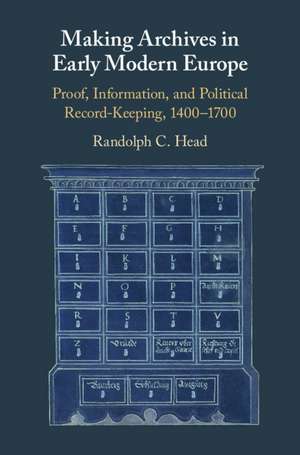Making Archives in Early Modern Europe: Proof, Information, and Political Record-Keeping, 1400–1700
Autor Randolph C. Headen Limba Engleză Hardback – 26 iun 2019
| Toate formatele și edițiile | Preț | Express |
|---|---|---|
| Paperback (1) | 320.75 lei 6-8 săpt. | |
| Cambridge University Press – 19 aug 2020 | 320.75 lei 6-8 săpt. | |
| Hardback (1) | 767.50 lei 6-8 săpt. | |
| Cambridge University Press – 26 iun 2019 | 767.50 lei 6-8 săpt. |
Preț: 767.50 lei
Preț vechi: 892.44 lei
-14% Nou
Puncte Express: 1151
Preț estimativ în valută:
146.90€ • 151.39$ • 124.02£
146.90€ • 151.39$ • 124.02£
Carte tipărită la comandă
Livrare economică 01-15 martie
Preluare comenzi: 021 569.72.76
Specificații
ISBN-13: 9781108473781
ISBN-10: 1108473784
Pagini: 364
Ilustrații: 19 b/w illus.
Dimensiuni: 158 x 235 x 21 mm
Greutate: 0.66 kg
Editura: Cambridge University Press
Colecția Cambridge University Press
Locul publicării:Cambridge, United Kingdom
ISBN-10: 1108473784
Pagini: 364
Ilustrații: 19 b/w illus.
Dimensiuni: 158 x 235 x 21 mm
Greutate: 0.66 kg
Editura: Cambridge University Press
Colecția Cambridge University Press
Locul publicării:Cambridge, United Kingdom
Cuprins
Foreword: writing the history of archives; 1. Introduction: records, tools and archives in Europe to 1700; 2. Archival history: literature and outlook; Part I. The Work of Records (1200– ): 3. Probative objects and Scholastic tools in the High Middle Ages; 4. A late medieval chancellery and its books: Lisbon, 1460–1560; 5. Keeping and organizing information from the Middle Ages to the sixteenth century; 6. Information management in early modern Innsbruck, 1490–1530; Part II. The Challenges of Accumulation (1400– ): 7. The accumulation of records and the evolution of inventories; 8. Early modern inventories: Habsburg Austria and Würzburg; 9. Classification: the architecture of knowledge and the placement of records; 10. The formal logic of classification: topography and taxonomy in Swiss urban records, 1500–1700; Part III. Comprehensive Visions and Differentiating Practices (1550– ): 11. Evolving expectations about archives, 1540–1650; 12. Registries: tracking the business of governance; Part IV. Rethinking Records and State Archives (1550– ): 13. Understanding records: new perspectives and new readings after 1550; 14. New disciplines of authenticity and authority: Mabillon's diplomatics and the ius archive; 15. Conclusion: the era of chancellery books and beyond.
Recenzii
'Head's reach is remarkable as he tracks the concepts and practices, the people and motives behind the explosive growth of administrative archives between 1200 and 1700 across a wide swath of European polities. He combines deep dives into little-known sources with judicious reflection on the impact of archives on both early modern governance and current historical practice.' Ann Blair, Carol H. Pforzherimer Professor, Harvard University, Massachusetts
'This book provides a new understanding of different modes of organizing records and archives as shaped by medial and governance processes in Europe, between 1400 and 1700. Archives are presented as cultural and political sites being shaped by cultural and political actors. Randolph Head shows how the comparative approach - spanning places, times, languages, and cultures - is a powerful analytical tool and an invaluable method of historical investigation.' Eric Ketelaar, Universiteit van Amsterdam
'A remarkably learned exploration of finding tools, record-keeping methods and pre-modern archival theories across many European countries. Randolph Head brings order to the expanding field of the history of archives by tracing the sometimes desperate efforts of late medieval and early modern archivists who tried to order their own growing masses of documents. Highly recommended.' Filippo de Vivo, Birkbeck, University of London
'This in-depth, scholarly history is ideal for librarians, archivists, graduate students, and scholars of history, particularly the history of books.' A. H. Widder, Choice
'… the main merit of the book lies in its finely calibrated balance between a general discourse on the role played by archives in the formation of European statehood and the presentation of specific documents, archives, and inventories.' Marco Cavarzere, German Historical Institute London Bulletin
'The book is a tremendous contribution to the history of archives and of early modern Europe.' Francis X. Blouin Jr., American Historical Review
'This book provides a new understanding of different modes of organizing records and archives as shaped by medial and governance processes in Europe, between 1400 and 1700. Archives are presented as cultural and political sites being shaped by cultural and political actors. Randolph Head shows how the comparative approach - spanning places, times, languages, and cultures - is a powerful analytical tool and an invaluable method of historical investigation.' Eric Ketelaar, Universiteit van Amsterdam
'A remarkably learned exploration of finding tools, record-keeping methods and pre-modern archival theories across many European countries. Randolph Head brings order to the expanding field of the history of archives by tracing the sometimes desperate efforts of late medieval and early modern archivists who tried to order their own growing masses of documents. Highly recommended.' Filippo de Vivo, Birkbeck, University of London
'This in-depth, scholarly history is ideal for librarians, archivists, graduate students, and scholars of history, particularly the history of books.' A. H. Widder, Choice
'… the main merit of the book lies in its finely calibrated balance between a general discourse on the role played by archives in the formation of European statehood and the presentation of specific documents, archives, and inventories.' Marco Cavarzere, German Historical Institute London Bulletin
'The book is a tremendous contribution to the history of archives and of early modern Europe.' Francis X. Blouin Jr., American Historical Review
Notă biografică
Descriere
Compares the archives of European states after 1500 to reveal changes in how records supported memory, authority and power.
